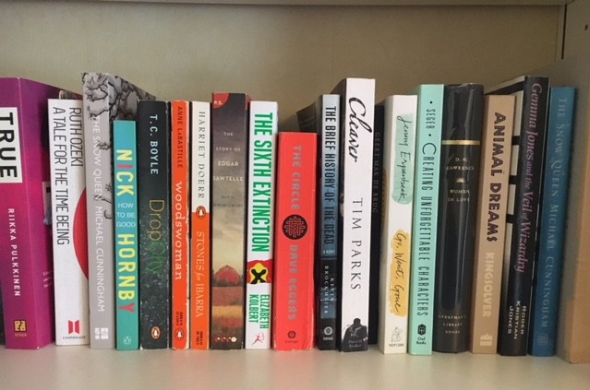
Pumpkin Spice Latte
First, let’s talk coffee. Imagine you’re on a trip and need a cup of gourmet coffee. You check your coffee app, and discover there are two coffee shops within walking distance. One is a Starbucks and the other is The Daily Grind, a small, locally owned coffee house just a bit further away. If given a choice, would you go for Starbucks coffee or would you seek out that independent coffee house? In other words, do you want guaranteed taste, consistency and quality no matter what part of the globe you find yourself in, or do you want to take a chance on the unknown little guy?
Of course the decision isn’t that simple. If The Daily Grind looks low budget from the outside and doesn’t have any customers, you’ll most likely go for Starbucks. But, if The Daily Grind has a cool looking storefront, a decent number of 4 and 5 star reviews online, a good vibe and contented looking customers hanging about, it’s indie-character might win you over.
Personally, I don’t mind hitting up a Starbucks once in a while, but I prefer supporting small, locally-owned coffee houses.Now what goes better with a cup of coffee than a novel? Okay, maybe a newspaper or bagel might have been your first thought, but I certainly love a date with a novel in a coffee house, sipping a latte while diving into a fictional world.
 This got me thinking about my reading choices. Quite a few of the novels lining my shelves are of the Starbucks variety; novels already proven by the industry, published by one of the big five publishing houses (Simon & Schuster, Macmillan, Hachette, Harper Collins, Penguin Random House) or an imprint of the big five.
This got me thinking about my reading choices. Quite a few of the novels lining my shelves are of the Starbucks variety; novels already proven by the industry, published by one of the big five publishing houses (Simon & Schuster, Macmillan, Hachette, Harper Collins, Penguin Random House) or an imprint of the big five.
When eBooks came out, the make up of my book shelf changed. I now have a large number of self-published and small-press authors on my Kindle–authors I would have never discovered in a book store, but have come into my line of sight through my reading preferences or my online blog reading.
I’ve written about Francis Guenette, a Canadian author I discovered online as well as Rebecca Lawton. Both authors published by small-presses. But I haven’t really explained what I like about small press and indie authors.
When I find a good indie novel, I have a feeling that I’ve discovered something that the world hasn’t. Call it selfish, but when you are the one who discovers a gem (indie novel that grabs you) among a sea of plastic debris (indie novels that are poorly written, lack plot, are loaded with typos), there’s a sense of pride and strange possession. You might think to yourself; I am one of maybe five hundred people that has heard of or read this author. They’re no Tom Clancy, Nora Roberts or Margaret Atwood, but still, even if the prose aren’t as polished, even if the plot has a bit of a diamond-in-the-rough quality, there’s an integrity to the writing that keeps you going.
As the author of only two novels thus far, I’m particularly impressed with prolific indie authors. How do they keep coming up with all of those characters and stories and creativity and how do they make the time to breathe life into all of them? Today, in honor of her birthday, I’d like to shine the spotlight on a fellow indie author Jo Lambert. I’d like to add up front that I haven’t yet read Jo’s novels, but I do like her diligence.
I feel like I know her a bit, as I met her in an author group, and she’s very supportive of other writers.
Jo is a self-published author who released her first novel, When Tomorrow Comes in 2009. She writes drama-driven romance, ranging from generational stories that follow a series of families over time, to focusing on just a few central characters. She describes her writing as typically British and often written around village life.Her first three novels were released under the name Joanna Lambert, whereas the last four are written under Jo Lambert. I’ll have to ask her why she chose to shorten her first name, as this makes it a bit tricky to find all of her titles in one place.
As an author, I have no shortage of ideas. I also have no shortage of self-sabotaging behavior. As mentioned earlier, I’ve managed to publish two novels so far, but I have six WIPs (works in progress) that are in various phases of completion. Thus you can see why I admire Jo.
To date, Jo (Joanna) Lambert has seven published novels under her belt with an eighth on the way. Eight! Her novels are mainly set in England. Her debut novel in Somerset, for example and Summer Moved On and Watercolours in the Rain in South Devon. Her novels sometimes wander into other landscapes such as Tuscany in The Other Side of Morning, but it seems she remains true to her cultural heritage by keeping the others within her home country of England.
Jo is currently working on her eighth novel entitled The Boys of Summer (not yet released). Her latest novel is based around a small fishing town in Cornwall.
When I asked Jo what motivates her to write, she had the following to say:
“I simply have to write, to make up stories, create parallel universes. It’s there and I can’t think of anything else I would rather do!”
BLOG: http://jolambertwriter.blog
BOOK WEBSITE: http://jolambertbooks.com
GOOGLE PLUS:google.com/+JoLambert
TWITTER: @jolambertwriter
FACEBOOK: https://www.facebook.com/jolambert185





 So you’ve happened upon my blog. Welcome and I’m glad you found me! In a nutshell, I’m an indie author and I write contemporary romance with an eco-conscience. Today I have decided to share Chapter 1 of
So you’ve happened upon my blog. Welcome and I’m glad you found me! In a nutshell, I’m an indie author and I write contemporary romance with an eco-conscience. Today I have decided to share Chapter 1 of 












 U.S. readers can order a copy of the
U.S. readers can order a copy of the